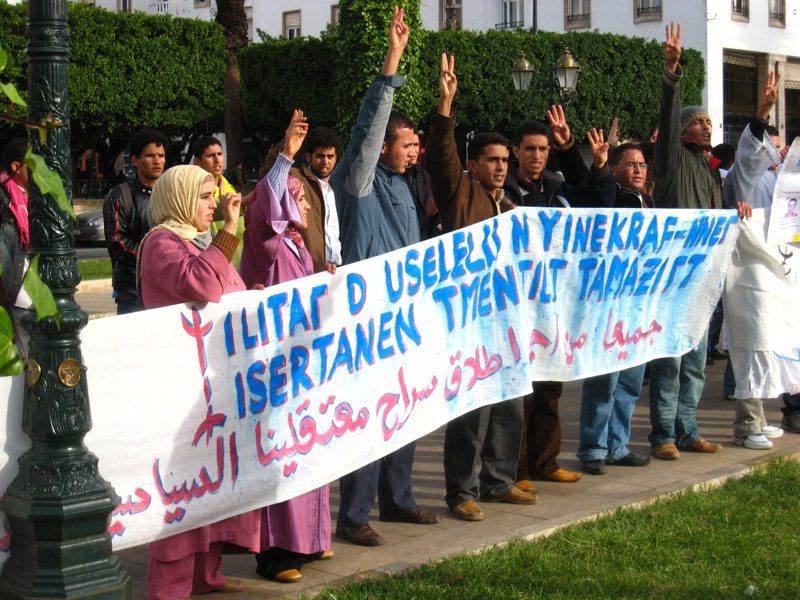
Caught between international obligations and Islamic law, human rights in Morocco have followed an uneven path. After almost four decades of repression under King Hassan II, known as the ‘Years of Lead’, hope for reform was high when King Mohammed VI came to power in 1999.
Between 1999-2008, a series of reforms were implemented. These included the setting up of a commission to determine compensation for victims of human rights violations; the establishment of an Equity and Reconciliation Commission (ERC), the only one of its kind in the Arab world, to allow victims to speak publicly about their ordeals; official recognition of the Amazigh language and culture; the revised Family Code of 2004, which goes some way to addressing women’s rights and gender equality; and the Nationality Code, revised in 2008 to ease women’s ability to pass citizenship to their children. The reforms were welcomed inside and outside of Morocco and the country’s Western allies heralded their scope and pace.
These achievements are indeed remarkable, yet they have failed to stop human rights violations. Hence, the crackdown on Islamist groups after the 2003 Casablanca terrorist attacks (specifically relating to torture and arbitrary detention), a disregard for the rule of law, and a clampdown on the freedom of expression and association have raised eyebrows and consolidated the sanctity of Islam, the Western Sahara and the king.
Has Morocco under King Mohammed VI truly embarked on the road to reform, or are the measures implemented since 1999 in fact a continuation of the same system of co-optation employed by Hassan II?
A recent series of investigations undertaken by various Moroccan civil society actors evaluated the government’s ‘participatory approach’ and raised numerous concerns about the state of human rights. According to the evaluation, all the democratic forces in Morocco need to unite and stand firm in order to safeguard the hard-won democratic gains and preclude any deterioration in fundamental rights and freedoms.
The investigations confirmed what women’s and human rights associations, Amazigh rights associations, the media and labour movements already knew: that the government has spent millions of dirhams over the years on participatory advocacy forums, meetings and ‘dialogue-promoting’ events, only to come up with laws that fall short of the forums’ recommendations.
According to human and Amazigh rights activist Ahmed Assid, the government has used ‘participatory governance’ and other modern and progressive democratic terms to legitimize its undemocratic or unconstitutional decisions, such as an attempt to lower the age of marriage to 16 and the ongoing marginalization of the Amazigh people, despite recognition of Amazigh as an official language.
On 13 April 2016, the US State Department published its Country Reports on Human Rights Practices. According to the report on Morocco, practices such as torture and disappearances had decreased since 1970s and ‘80s, but corruption and a disregard for the rule of law on the part of some security forces had increased. The Moroccan government dismissed the allegations as “outrageous” and heavily “biased”.
For several decades, at least since the First Gulf War (1990-1991), the world has been preoccupied with the question of how to bring change to the Middle East and North Africa. In other words, what is needed to establish and consolidate democracy and human rights for the region’s people, and in what ways international partners, mainly the United States, can play an active role.
In 2016, it is clear that successful democratic reform must come from within, and that it requires a careful balance of ingredients: political will at the very top, a modern constitutional framework, strong and delineated institutions, a free press, diverse media and a dynamic civil society. Finally, peace and stability are essential.
In Morocco, the issue of human rights has found its way onto the parliamentary agenda and is being debated by the government and opposition. Sensitive topics such as corruption, abortion and the death penalty continue to animate these debates. Other controversial subjects such as homosexuality and eating in public during Ramadan are discussed with increasing openness. At the same time, national and international NGOs report continued and widespread human rights abuses.
Morocco is not alone in this regard. Its faltering progress is a reflection of the worsening human rights situation across the Middle East and North Africa. As the region struggles to combat rising terrorism, more powerful democracies around the world remain silent.


